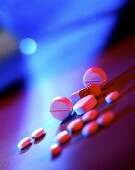
WEDNESDAY, May 1 (HealthDay News) — Depression is relatively common in patients who undergo heart bypass surgery, and a new study finds that short-term use of antidepressants may aid patients’ recovery.
“Depression among patients requiring or having undergone [bypass] surgery is high and can significantly impact postoperative recovery,” said one expert not connected to the study, Dr. Bryan Bruno, acting chairman of the department of psychiatry at Lenox Hill Hospital in New York City.
In this study, a team of French researchers looked at 182 patients who started taking a selective serotonin reuptake inhibitor (SSRI) antidepressant two to three weeks before undergoing coronary artery bypass graft surgery and continued taking it for six months after the procedure.
SSRIs include widely used antidepressants such as Celexa, Lexapro, Prozac, Paxil and Zoloft. In this study, patients took one 10 milligram tablet of Lexapro (escitalopram) daily. The study was funded by Lexapro’s maker, H Lundbeck A/S.
The outcomes of patients prescribed Lexapro were compared to 179 patients who took an inactive placebo instead of the antidepressant.
During the six months after the surgery, the patients who took the antidepressant reported less depression and better quality of life than those who took the placebo, the researchers reported.
In addition, taking antidepressants did not increase the risk of complications or death in the year after surgery, according to the study, which appears in the May issue of the Annals of Thoracic Surgery.
The study suggests that taking the antidepressant “enables patients who were at least slightly depressed before surgery for coronary artery disease to feel better more quickly after surgery, without influencing the complication rate,” study leader Dr. Sidney Chocron said in a journal news release.
“Even slight depression before coronary surgery can delay a patient’s mental recovery and increase the feeling of pain after surgery,” added Chocron, a professor of cardiac surgery at University Hospital Jean Minjoz in Besancon.
Prescribing antidepressants for patients before they have heart bypass surgery helps them “get on with their lives more quickly after such a serious surgical procedure,” Chocron said in the news release.
Bruno agreed that treating even mild depression is important.
“I agree with the authors’ concluding suggestion that, unless contraindicated, there should be a relatively low threshold . . . for initiating antidepressant therapy” in these types of heart patients, he said.
But another expert said the study reveals little about the strategy for patients with more severe depression.
“The mild benefit associated with the use of antidepressants in this study is consistent with a population which was not significantly depressed,” noted Dr. Dan Iosifescu, director of the Mood and Anxiety Disorders Program and associate professor of psychiatry and neuroscience at Mount Sinai School of Medicine in New York City.
He said “the patients in this study had depressive symptoms in a range which usually does not qualify for a diagnosis of depression.” Therefore, “on balance this study provides helpful information on the safety of antidepressants in post-[bypass] patients,” Iosifescu said, “but does not contribute to our understanding of their usefulness since the study population appears to have very low rates of depression.”
More information
The U.S. National Heart, Lung, and Blood Institute has more about coronary artery bypass graft surgery.

